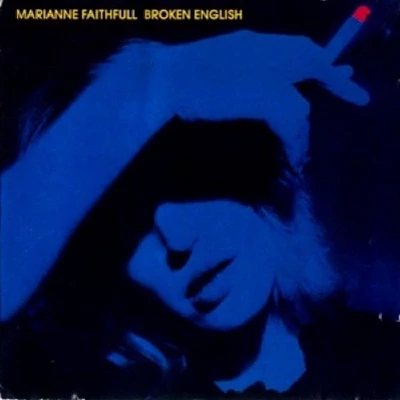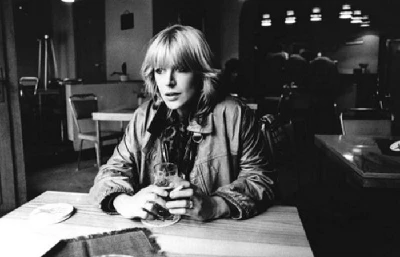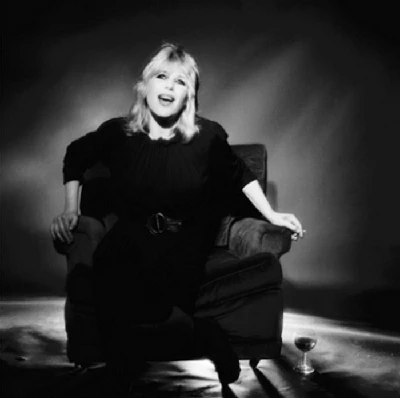published: 24 /
1 /
2013

In our 'Re:View' section, in which our writers look back at albums from the past, John Clarkson reflects upon Marianne Faithfull's classic 1979 comeback album, 'Broken Edition', which has recently been re-released in a deluxe edition
Article
The 1970s were turbulent years for singer Marianne Faithfull. At the start of the decade in May 1970 her much publicised four year relationship with Mick Jagger came to an end, and later on that year she lost custody of her then five year old son Nicholas to her first husband, John Dunbar, which lead to her attempting suicide.
Faithfull had become addicted first of all to cocaine in 1968, and as the 1960s had ended that addiction had spread to also include heroin. There is always a lot of speculation and myth-making about larger-than-life characters such as Marianne Faithfull. It appears, however, that as the 1970s moved on and her heroin dependency cascaded her further downwards, that she spent some time - up to two years according to some sources and her 1994 autobiography - homeless and living on the streets of Soho.
Faithfull was able to get herself together enough to participate in a few small budget film and television roles in the 1970s in her other career as an actress, and there were two early albums. The first 1971’s 'Rich Kid Blues' was shelved, only finally seeing release in 1985, and the second, 1976's 'Dreamin' My Dreams' (which was rebranded and re-released as 'Faithless' two years later), was a largely forgettable set of country and western covers. Released on the floundering NEMS label and involving four producers, its title single went to number one for seven weeks in the Irish chart, but otherwise it remained little heard.
By the late 1970s Faithfull was in only marginally better shape, still addicted to drugs, and (again according to story) living in a Chelsea squat without electricity of hot water with her boyfriend and eventual second husband, Ben Brierly. In the last few weeks of 1979, she, however, released her final album of the decade and extraordinary comeback album, 'Broken English'.
‘Broken English’ was released on the bigger-budgeted and notoriously risk-taking Island Records, and recorded over a six month period in London. For fans that only remembered Marianne Faithfull as the wistful folk singer of the 1960s and singles such ‘As Tears Go By’ and ‘This Little Bird’, it came as a shock.
The colourful sleeves of her three 1960’s albums, ‘Come My Way’ (1965), ‘Marianne Faithfull’ (1966) and ‘Love in a Mist’ (1967), which each saw her smiling prettily at the camera, had gone, and been replaced by a blue-tinged print, which found Faithfull coiling away from photographer Dennis Morris, her arm swept across her face and shadowing her eyes, a lit cigarette at the end of her fingers poking upwards. The softly melodic vocals of her early albums were also a part of the past, and in their place her voice, ravaged by years of smoking, drinking and hard drug use, was deeper in pitch, and a cracked rasp.
Punk infused much of ‘Broken English’. Brierly, another heroin addict, was the bassist at the time in the punk band the Vibrators. While Faithfull turned down the role of playing Sid Vicious’ mother in ‘The Great Rock ‘n’ Roll’, unable to bear the thought of her mother or son having to see it, Brierly had introduced her to the Sex Pistols, and she had been on the edge of that scene, becoming friends with several of the main movers of the movement including John Lydon.
‘Broken English’ combined together razor tight reggae riffs and abrasive, exploding guitars. With Faithfull’s old friend, 60’s icon and Traffic front man Steve Winwood on the then relatively new-on-the-market synthesizers, it, however, not so much nodded at the past, but to the future and then still-in-its-infancy post-punk scene.
Its lyrics were similarly gutsy and hard-hitting. The title track – all slowly pulsating synthesizers and washes of guitar – took as its main focus the German left-wing terrorist group, the Baader-Meinhof Gang, which Faithfull had enjoyed reading a book about. While not especially sympathetic of her politics (“What are you fighting for?” she would sing in its chorus), Faithfull recognised something of herself in their leader, Ulrike Meinhof, and a shared sense for passion and self-destructiveness. When she watched a documentary about the gang shortly before recording the track, she took a quote from Meinhof from it –“Say it in broken English” – and used it in the song’s main lyric and title.
‘The Ballad of Lucy Jordan’ is a cover of a Shel Silverstein song, and – a cautionary tale to herself - tells the story of a bored suburban housewife who has ended up with the monotonous sort of life that Faithfull might have predicted for herself if she hadn’t ended up with first of all art gallery owner and socialite Dunbar and then Mick Jagger.
Other highlights include the bleak, self-loathing ‘Guilt’ (“I feel guilt/Though I have done nothing wrong I feel guilt”); ‘What’s the Hurry?’ which captures the daily despair of a drug addict living from one fix to the next, and a stark version of ‘Working Class Hero’, John Lennon’s bitter indictment of the social classes.
Most caustic of all was the final track, the six-and-a half minute ‘Why D’Ya Do It?’, and which, with lyrics composed by poet and painter Heathcote Williams, is possibly the most bruised account of sexual hurt and betrayal ever set to tape. Set against the backdrop of a jagged, squealing dub of guitar, it is a graphic, expletive-strewn account of a woman’s violent reaction to finding her lover has been unfaithful to her. “Why did you let that trash get a hold of your cock?” Faithfull spits at her boyfriend, which with that and its many other profanities earned the song a ban in the usually liberal Australia until 1988.
The new deluxe edition of ‘Broken English’ comes with an extra CD of demos, but it is the full edition of the album with Winwood’s atmospheric synthesizers that is essential. With its bare, bloody-minded honesty and in both its vulnerability and out-and-out defiance, it remains powerful and timeless listening.
Track Listing:-
Band Links:-
http://www.mariannefaithfull.org.uk/
https://www.facebook.com/mariannefaith
https://x.com/faithfull_m
https://www.instagram.com/mariannefait
https://en.wikipedia.org/wiki/Marianne
Picture Gallery:-

